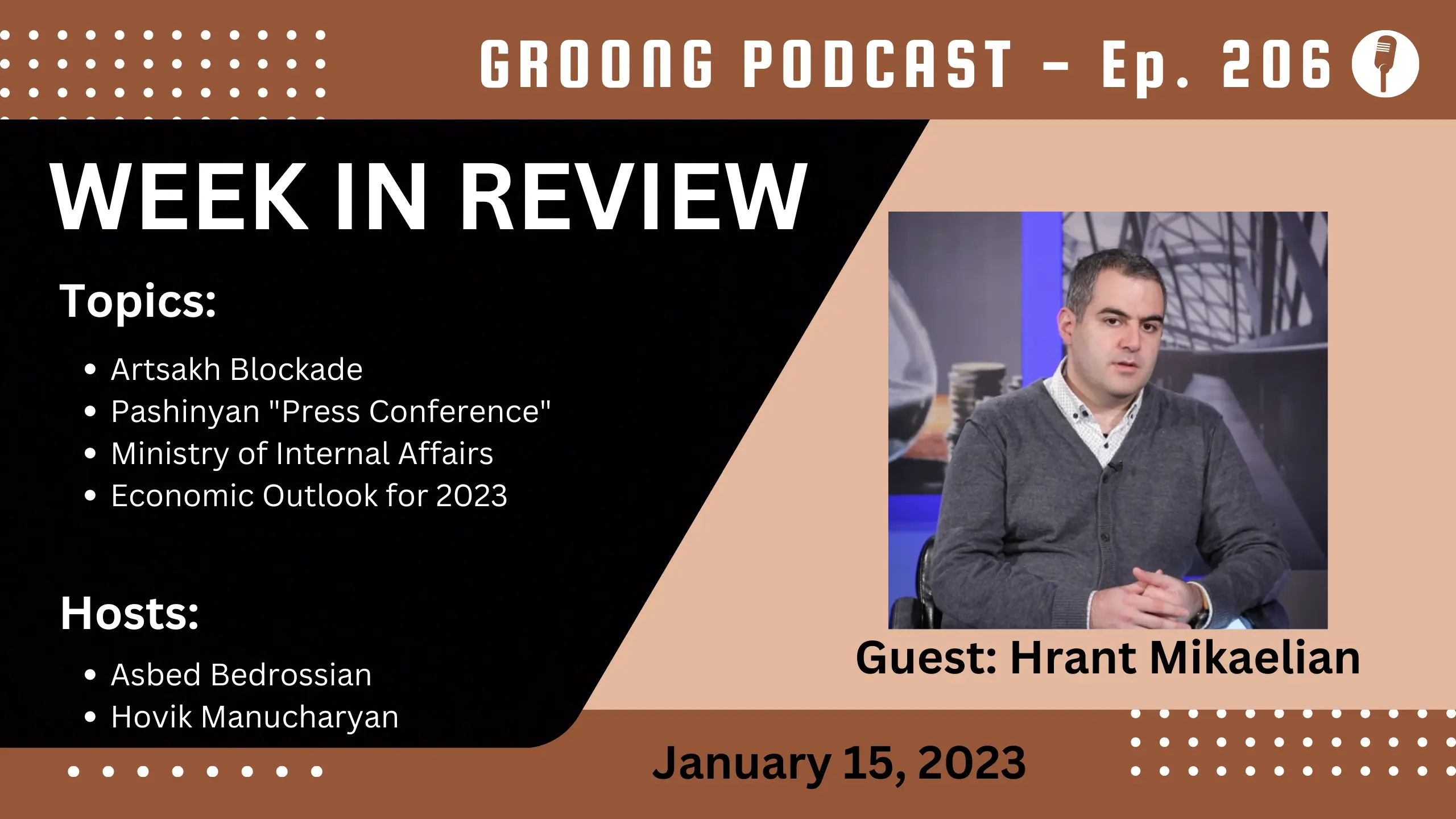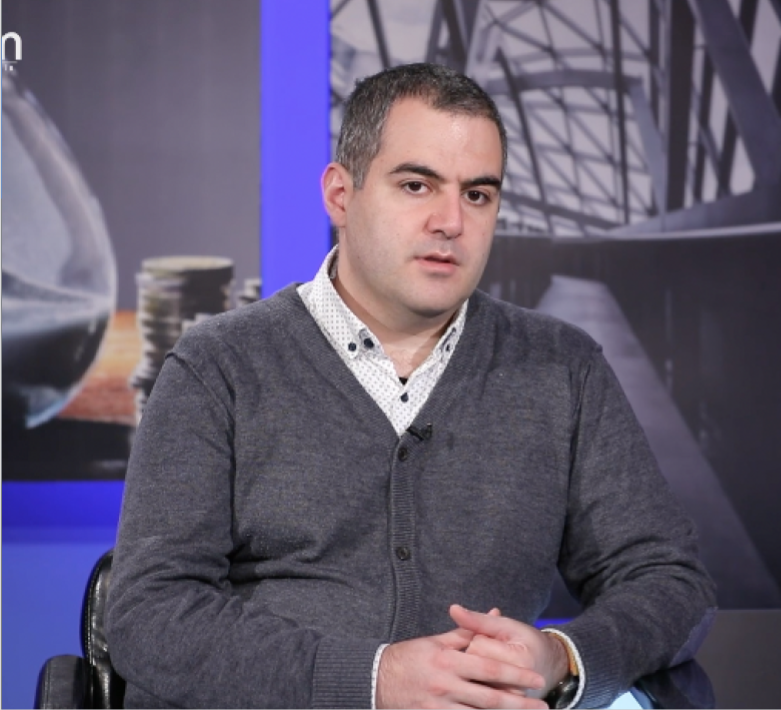
Guest:
- Hrant Mikaelian, a political scientist and multidisciplinary researcher in social sciences based in Yerevan. He is also a senior researcher at the Caucasus Institute.
Topics:
- Artsakh Update and Politics in Stepanakert
- Pashinyan’s “Press Conference”
- Ministry of Interior Affairs Appointments
- Economic Review and Outlook in 2023
- Personal Comments
- Hrant - MPG polls results on Armenian Attitudes towards Russia
- Hovik - Stop the destructive internal politics
Episode 206 | Recorded: January 15, 2023
Show Notes
Artsakh Blockade Status
Well, we all know that Artsakh has been blockaded by Azerbaijan for over a month now. This happens to be day 35.
Last Monday afternoon, Artsakh’s main power line connecting Stepanakert and Goris was damaged. ArtsakhEnergo has still not been allowed access to the site of repairs to restore service. So each day there are rolling blackouts to make do with locally produced electricity.
Mid-week there was a 24-hour Internet outage, but service was restored by Friday evening. Per our reports from Stepanakert, supplies are low, food stamps are being implemented right now, and over 200 businesses have shut down, and so a serious state budget revenue shortfall is expected. This is where things stand for now.
New Cabinet Appointments
Turning to the politics in Stepanakert
Last week and this week, Artsakh president Arayik Harutyunyan and state minister Ruben Vardanyan announced new appointments to the cabinet.
- Srbuhi Arzumanyan First Deputy Chief of Staff for Arayik Harutyunyan.
- Aram Sargsyan, Minister of Urban Development.
- Armen Mangasaryan, Minister of Social Development and Migration.
- Hrant Safaryan, Minister of Agriculture.
- Suren Galstyan, Minister of Territorial Administration and Infrastructure,
The key appointment was Sergey Ghazaryan, who is taking over the post of foreign minister from David Babayan.
Questions:
- What do we know about Sergey Ghazaryan, except that he has the guts to take on this job at this difficult moment in Artsakh’s history?
- Why did we need a shuffling of the presidential cabinet right now? What were the reasons for it?
Is Ruben Vardanyan Staying or Leaving?
On Saturday rumors surfaced that Artsakh president Arayik Harutyunyan might release Ruben Vardanyan as State Minister. Vardanyan himself denied that he was going to resign, and his statement also said that under the current circumstances, it would be unacceptable for the president or parliament of Artsakh to resign, because it would fulfill the enemy’s agenda.
Hrant, on Sunday this news was on fire in Armenia.
Questions:
- What did you make of this… information?
- First of all, who published the original articles about Arayik Hauryunyan firing Vardanyan?
- Why would Harutyunyan, and the Artsakh parliament resign at this point in time?
- Is this the manifestation of a power struggle between Vardanyan and Harutyunyan? Or Vardanyan and Pashinyan? What’s going on?
Aliyev has been vehement in his declarations that he would never talk with Vardanyan, and that he wants Vardanyan to leave Artsakh as quickly as possible. Their press has speculated publicly about carrying out raids into Stepanakert to either arrest him or even assassinate him.
- Has Aliyev’s irritation with Vardanyan’s presence in Stepanakert become a source of problems for Pashinyan and his so-called “agenda of peace”?
Pashinyan’s “Press Conference”
Nearly a dozen press and media outlets were left out of the invitation list to attend Nikol Pashinyan’s press conference on Monday. The Union of journalists of Armenia called on Pashinyan to rectify the situation and allow access to all Armenian news outlets.
It seems like this press conference was mostly a staged show for Pashinyan to make statements in the form of questions that he wanted asked, in order to give prepared answers for them. Also notable was the fact that Pashinyan and Aliyev held their major press conferences on the same day. Maybe next week we should talk about Aliyev’s statements.
Some main points he made:
- Armenia is using its “diplomatic toolkit” to put pressure on Azerbaijan to open the Lachin corridor.
- It can be said that Armenia not only doesn’t consider using force to secure the Armenians of Artsakh, but it refuses to even prepare for a coming war.
- Pashinyan denied that Armenia has threatened to leave the CSTO if Russia can not open communications by Tuesday, January 10.
- We should note that on the same day, Armenia declined to hold CSTO military exercises in Armenia in 2023, with a statement that contradicted the Russian defense minister’s statement, and surprised the Russians.
- At the same time, Armenian officials announce that it is the CSTO that is leaving Armenia.
- Pashinyan talked about the discussions with both Russia, and the CSTO, about Armenia’s expectations for its allies’ red lines regarding the inviolability of its borders. Among other statements, he floated the idea that the Russian base in Armenia is more of a liability than a security cornerstone for Armenia’s defense, if the Russians are unwilling to act.
- Pashinyan said that Armenia is changing its point of view regarding its regional political orientation, and the process of “normalization” with Turkey, and the recent opening of the Turkish-Armenian border for air-cargo is a result of that.
- He blamed Azerbaijan’s corridor demands as a hindrance to regional peace.
- Pashinyan said that his policy towards Artsakh is to have them decide their own fate, rather than the government of Armenia. He said Armenia would support the Armenians of Artsakh “by all available means”, and he pointed to the sums that his government had allocated to rebuild Artsakh.
- Pashinyan denied that there have been any “official” invitations for Armenia to join the Russia-Belarus “Union State”, but he said such ideas may have been voiced by political analysts (who were not identified).
- Pashinyan said that Azerbaijan is still keeping around 200 Armenian POWs as a lever to pressure the Armenian side in negotiations.
- Pashinyan predicts that Armenia is able to ensure 7% economic growth in 2023. For reference the World Bank expects 4.1%, but the war in Ukraine remains a major factor of uncertainty in Armenia’s economic growth.
Given what we’ve heard:
- Is a “diplomatic toolkit” going to be sufficient to force Azerbaijan to open the Lachin corridor?
- What is Pashinyan referring to when he says it’s time for Armenia to “change its perspective”?
It’s clear that Pashinyan is hinting that the closure of the Russian base in Armenia is on the table for him. He left a level of ambiguity to give himself an out, but the trial balloon is clear.
The removal of Russia from the South Caucasus is a fundamental western geopolitical goal and we’ve discussed this on our show in the past.
- What would be the consequences of such a move on the part of the Armenian government?
Ministry of Interior Affairs Appointments
In December the parliament approved the Ministry of Justice proposal to consolidate the police, rescue, and immigration services into a new Ministry of Interior. Last weekend Pashinyan named his new minister of interior to be a childhood friend of his, Vahe Ghazaryan. The move was widely criticized by the opposition, as well as civic groups and international NGOs.
- What are the ramifications of this appointment to the leadership of basically all of the police forces of Armenia?
Economic Outlook in 2023
In his press conference, Pashinyan said that for 2022 his government had predicted or promised 7% economic growth, but due to the effects of the war in Ukraine something around 12-13% was achieved. In fact what I recall was that his minister of the economy had promised a double digit growth, but anyway.
For 2023, Pashinyan expects 7% economic growth. The World Bank expects 4.1%.
Questions:
- Hrant, what does the Central Bank of Armenia expect, and what do you think is possible, or reasonable?
- What are the major factors that could push the economic growth up or down in the coming year?
- Where do you expect Armenia’s inflation to be in 2023? Why?
Topics from the Panelists
- Hrant - On MPG poll results on Armenian attitudes towards Russia
- Hovik - On the destructive Armenian internal politics
Wrap-up
We hope you found our Week in Review helpful. We invite your feedback and your suggestions. You can find us on most social media and podcast platforms. Thanks to Laura Osborn for the music on our podcasts.
Guests

Hrant Mikaelian
Hrant Mikaelian, a political scientist and multidisciplinary researcher in social sciences based in Yerevan. He is also a senior researcher at the Caucasus Institute. Hrant is a co-founder of the Armenian Project.
Hosts

Hovik Manucharyan
Hovik Manucharyan is an information security engineer who moved from Seattle to Armenia in 2022. He co-founded the ANN/Groong podcast in 2020 and has been a contributor to Groong News since the late 1990s.
Disclaimer: The views expressed by Hovik Manucharyan on the ANN/Groong podcast are his own and do not necessarily reflect the opinions of his employer or any other organization.

Asbed Bedrossian
Asbed Bedrossian is an IT professional, and for years oversaw the central IT enterprise infrastructure and services at USC. His decades of experience spanned across IT strategy, enterprise architecture, infrastructure, cybersecurity, enterprise applications, data center operations, high performance computing, ITSM, ITPM, and more.
Asbed founded the Armenian News Network Groong circa 1989/1990, and co-founded the ANN/Groong podcast in 2020.